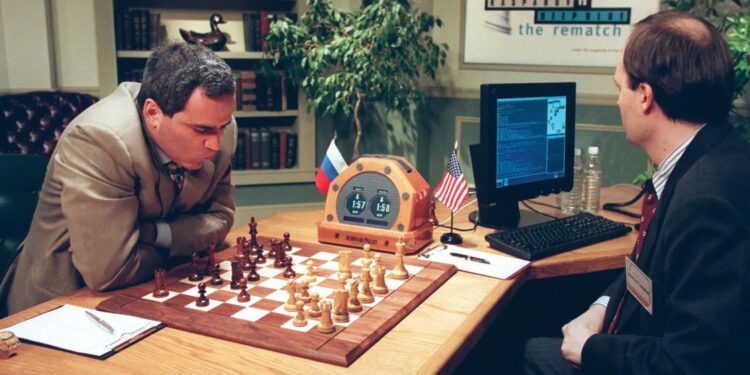On May 11, 1997, the chess world witnessed a watershed moment when IBM’s supercomputer Deep Blue defeated world chess champion Garry Kasparov in a six-game match. This historic victory marked the first time a computer had defeated a reigning world champion in a classical chess match under tournament conditions, signaling a new era in the relationship between humans and artificial intelligence.
The Match That Changed Chess Forever
The 1997 rematch between Deep Blue and Kasparov came after Kasparov had defeated an earlier version of the computer in 1996. IBM’s team spent the intervening year significantly upgrading Deep Blue’s hardware and software. The final score of the 1997 match was 3½–2½ in favor of Deep Blue, with the computer winning two games, drawing three, and losing one.
The Technology Behind Deep Blue
Deep Blue was a specialized chess-playing computer developed by IBM. At the time of the match, it could evaluate approximately 200 million chess positions per second. The system combined sophisticated hardware with advanced chess algorithms:
- Custom-designed chess chips that could evaluate positions rapidly
- A database of over 700,000 grandmaster games
- An extensive opening book and endgame tablebase
- A parallel processing system with 30 IBM RS/6000 SP processors
Unlike modern chess engines that use neural networks, Deep Blue relied primarily on brute-force calculation combined with human-programmed chess knowledge.
The Human Impact
Kasparov, widely considered the greatest chess player of all time, was visibly shaken by the defeat. After the match, he suggested that there might have been human intervention during gameplay, though these claims were never substantiated and IBM denied them. The company retired Deep Blue shortly after the match.
The psychological aspects of the contest were profound. Kasparov later admitted that knowing he was playing against a machine affected his strategy and mindset. The match highlighted not just computational advantages but also the psychological dynamics at play when humans compete against machines.
Legacy and Significance
Deep Blue’s victory represents a pivotal moment in the history of artificial intelligence. It demonstrated that computers could outperform humans in tasks requiring deep strategic thinking, not just calculation. The match captured global attention and sparked debates about the future relationship between humans and intelligent machines.
This achievement paved the way for further advancements in AI for games and beyond. Today’s chess engines far surpass Deep Blue’s capabilities, and AI has gone on to master more complex games like Go and StarCraft II. The 1997 match remains a symbolic milestone in computing history, marking a clear before-and-after moment in our understanding of machine intelligence.
The legacy of Deep Blue continues to influence discussions about AI capabilities and limitations, reminding us how far artificial intelligence has come in just a few decades—and prompting us to consider where it might go next.
newshub



Recent Comments